- Home
- Quizzes
- My Quiz Activity
- Newsletters
- Sports Betting
- MY FAVORITES
- Add Sports/Teams
- SPORTS
-
NFL
- NFL Home
- Arizona Cardinals
- Atlanta Falcons
- Baltimore Ravens
- Buffalo Bills
- Carolina Panthers
- Chicago Bears
- Cincinnati Bengals
- Cleveland Browns
- Dallas Cowboys
- Denver Broncos
- Detroit Lions
- Green Bay Packers
- Houston Texans
- Indianapolis Colts
- Jacksonville Jaguars
- Kansas City Chiefs
- Las Vegas Raiders
- Los Angeles Chargers
- Los Angeles Rams
- Miami Dolphins
- Minnesota Vikings
- New England Patriots
- New Orleans Saints
- New York Jets
- New York Giants
- Philadelphia Eagles
- Pittsburgh Steelers
- San Francisco 49ers
- Seattle Seahawks
- Tampa Bay Buccaneers
- Tennessee Titans
- Washington Commanders
-
MLB
- MLB Home
- Arizona Diamondbacks
- Atlanta Braves
- Baltimore Orioles
- Boston Red Sox
- Chicago White Sox
- Chicago Cubs
- Cincinnati Reds
- Cleveland Guardians
- Colorado Rockies
- Detroit Tigers
- Houston Astros
- Kansas City Royals
- Los Angeles Angels
- Los Angeles Dodgers
- Miami Marlins
- Milwaukee Brewers
- Minnesota Twins
- New York Yankees
- New York Mets
- Oakland Athletics
- Philadelphia Phillies
- Pittsburgh Pirates
- San Diego Padres
- San Francisco Giants
- Seattle Mariners
- St. Louis Cardinals
- Tampa Bay Rays
- Texas Rangers
- Toronto Blue Jays
- Washington Nationals
-
NBA
- NBA Home
- Atlanta Hawks
- Boston Celtics
- Brooklyn Nets
- Charlotte Hornets
- Chicago Bulls
- Cleveland Cavaliers
- Dallas Mavericks
- Denver Nuggets
- Detroit Pistons
- Golden State Warriors
- Houston Rockets
- Indiana Pacers
- Los Angeles Clippers
- Los Angeles Lakers
- Memphis Grizzlies
- Miami Heat
- Milwaukee Bucks
- Minnesota Timberwolves
- New Orleans Pelicans
- New York Knicks
- Oklahoma City Thunder
- Orlando Magic
- Philadelphia 76ers
- Phoenix Suns
- Portland Trail Blazers
- Sacramento Kings
- San Antonio Spurs
- Toronto Raptors
- Utah Jazz
- Washington Wizards
-
NHL
- NHL Home
- Anaheim Ducks
- Arizona Coyotes
- Boston Bruins
- Buffalo Sabres
- Calgary Flames
- Carolina Hurricanes
- Chicago Blackhawks
- Colorado Avalanche
- Columbus Blue Jackets
- Dallas Stars
- Detroit Red Wings
- Edmonton Oilers
- Florida Panthers
- Los Angeles Kings
- Minnesota Wild
- Montreal Canadiens
- Nashville Predators
- New Jersey Devils
- New York Islanders
- New York Rangers
- Ottawa Senators
- Philadelphia Flyers
- Pittsburgh Penguins
- San Jose Sharks
- Seattle Kraken
- St. Louis Blues
- Tampa Bay Lightning
- Toronto Maple Leafs
- Vancouver Canucks
- Vegas Golden Knights
- Washington Capitals
- Winnipeg Jets
- NCAAF
- NCAAM
- Boxing
- Entertainment
- Lifestyle
- Golf
- MMA
- Soccer
- Tennis
- Wrestling
- More Sports
- RESOURCES
- My Account
- YB on Facebook
- YB on Twitter
- YB on Flipboard
- Contact Us
- Privacy Policy
- Terms of Service
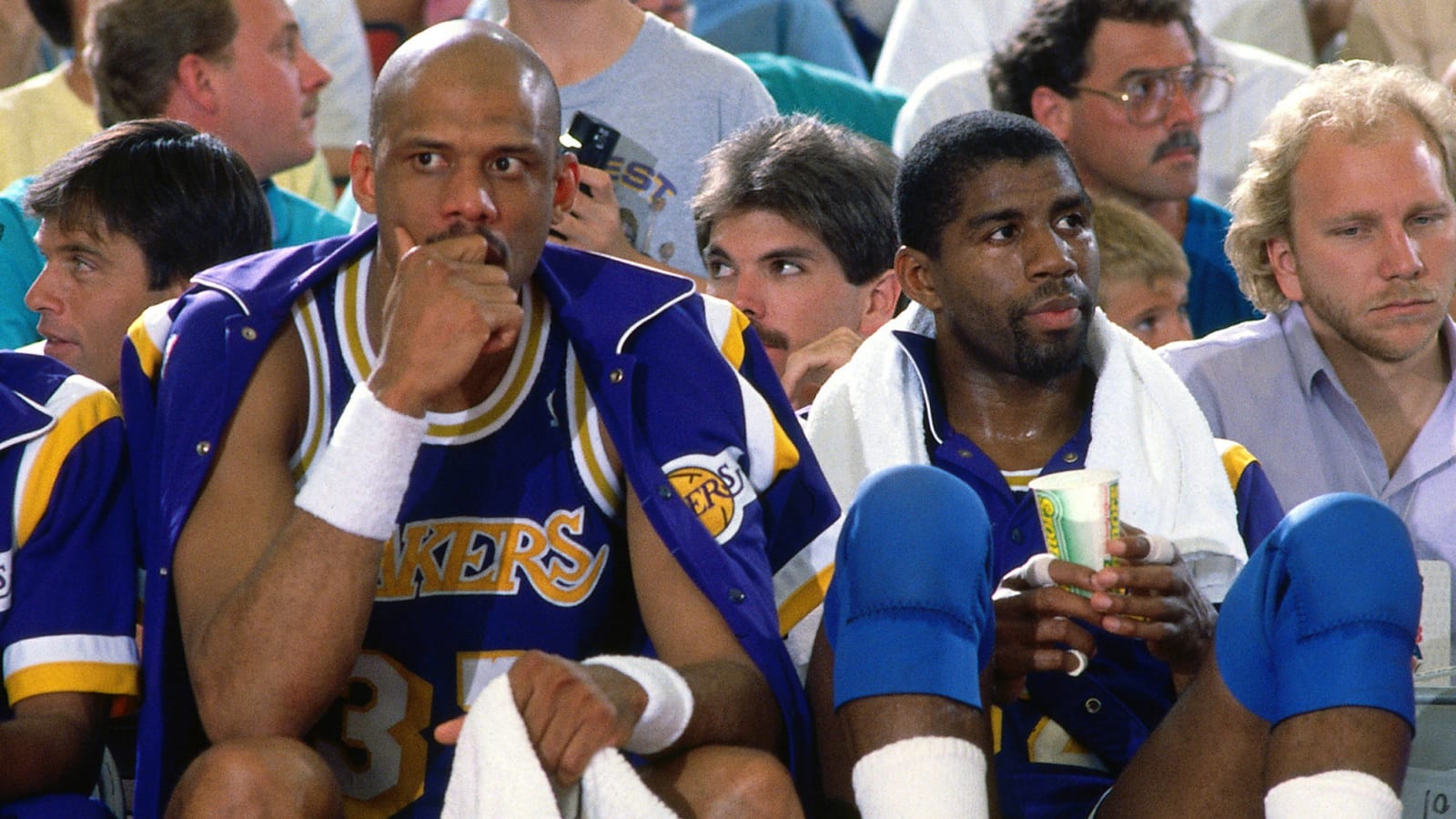
How each of the NBA dynasties ended
Possibly more than any of the other major sports leagues, the NBA has been defined by dynastic eras. Some teams dominated entire decades and created bonds that spanned generations. Some dynasties have run concurrently and created memorable championship moments, while others began at the expense of another. Let's go back and see how the NBA's greatest dynasties ended.
Minneapolis Lakers
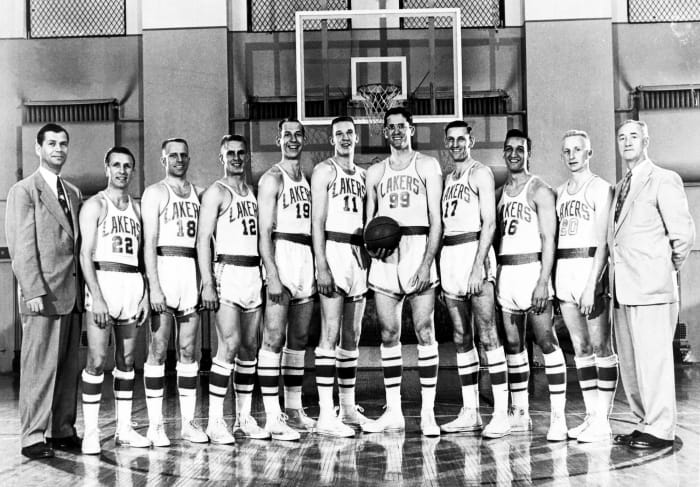
Dynasty: 1948-1954; Five championships, Five Finals appearances
The biggest reason the Minneapolis Lakers dynasty ended was the retirement of George Mikan following the 1954 NBA Finals. Mikan, who was only 29 when he retired, had suffered multiple broken bones and injuries during his career but would stay with the franchise as a general manager and coach (he even came back to play for several games), but the franchise wasn't the same. He was the NBA's first superstar, and his retirement put the team into some hard times and eventually led its relocation to Los Angeles.
St. Louis Hawks
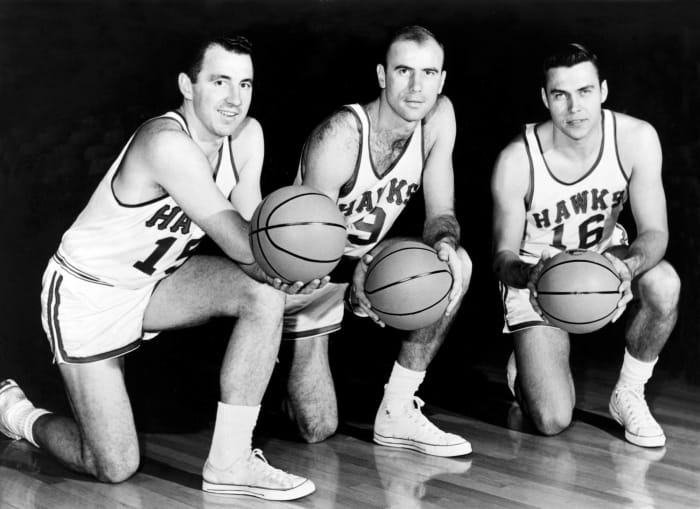
Dynasty: 1956-1961; one championship, four Finals appearances
Quite honestly, Bob Pettit may be the most underrated player in NBA history — he was simply marvelous. The beginning and the end of the team's outstanding run in the late 1950s and early 1960s came because of one decision it made in 1956. After drafting Bill Russell with the No. 2 pick in the draft, the Hawks dealt him to the Celtics for Cliff Hagan and Ed Macauley. Pettit, Hagan and Macauley formed the core of the Hawks' run of four Western Division titles, but Russell would go on to become the focal point of the Celtics dynasty of the 1960s. In fact, Russell's Celtics would beat the Hawks in the 1960 and 1961 NBA Finals, which launched their run of eight straight championships. The Hawks also suffered from the emerging Lakers and Wilt Chamberlain's relocated Warriors (who left Philadelphia for San Francisco and were moved to the Western Division), blocking the Hawks' path to the Finals.
Bill Russell's Celtics
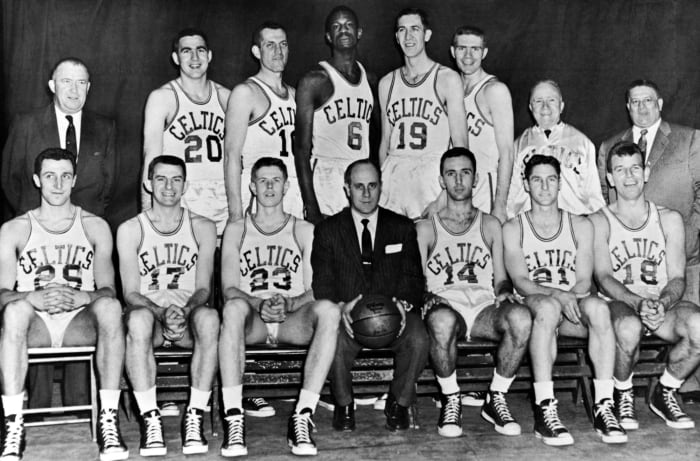
Dynasty: 1956-1969; 11 championships, 12 Finals appearances
Not only is this Celtics dynasty the best in NBA history, but it's possibly also the best in all of sports. Plus, despite the insane amount of this team's talent that was retiring, the franchise didn't take long to become championship contenders once again. Bill Russell's abrupt retirement as a player and coach after the 1969 Finals ended the dynasty, though Boston wasn't a dominant regular-season team over the last few seasons. The Celtics still had players like John Havlicek and Sam Jones but lacked a dominant center (which was a must in those days) to remain a title contender. They'd miss the postseason for two seasons but would win another NBA title in 1974.
1960s-70s Lakers
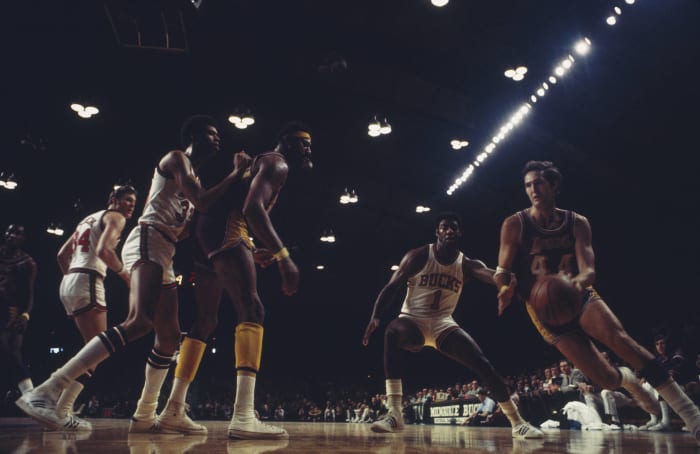
Dynasty: 1961-1973; one championship, nine Finals appearances
The West-Baylor dynasty had the unfortunate luck to run into the NBA's greatest dynasty of the Red Auerbach Celtics year after year. Simply put, this iteration of the Lakers just grew old — very old. Baylor retired early in the 1972 championship season, Wilt Chamberlain left after the 1973 season and West called it quits in 1974. There remained the talented Gail Goodrich and the team traded for Kareem Abdul-Jabbar, but the merger with the ABA (and Bill Walton entering the league) brought a lot of talent into the NBA, and other power teams emerged.
New York Knicks

Dynasty: 1969-1973; two championships, three Finals appearances
The Knicks' only championships came during this era when they beat the Lakers twice in three Finals. The run ended when Reed, DeBusschere and Lucas retired after the 1973-1974 season, and head coach Red Holzman was fired a few years later. Reed would take over as head coach before he was fired and Holzman returned. The magic of those early 1970s teams, which were built on ultimate team play and passion, just never came back, and the team struggled to stay relevant until it drafted Patrick Ewing with the top overall pick in 1985.
Dr. J's Sixers

Dynasty: 1976-1983; one championship, four Finals appearances
The 76ers finally got over the hump by stomping through the 1983 playoffs and winning the NBA championship...taking 12 of the 13 postseason games they played. It all looked like their winning ways would continue, as they drafted Charles Barkley in 1984 and were one of the best teams in the league. However, they would be squeezed out by the powerful Celtics and their three-time MVP, Larry Bird, as well as the emerging Detroit Pistons. The Sixers also made some poor personnel moves by trading Moses Malone to the Bullets for Jeff Rutland and Clifford Robinson in 1986 and then dealing away the top overall pick in the draft for Roy Hinson. Dr. J would retire following the 1986-1987 season, and it would take Philadelphia years to recover.
1980s Celtics
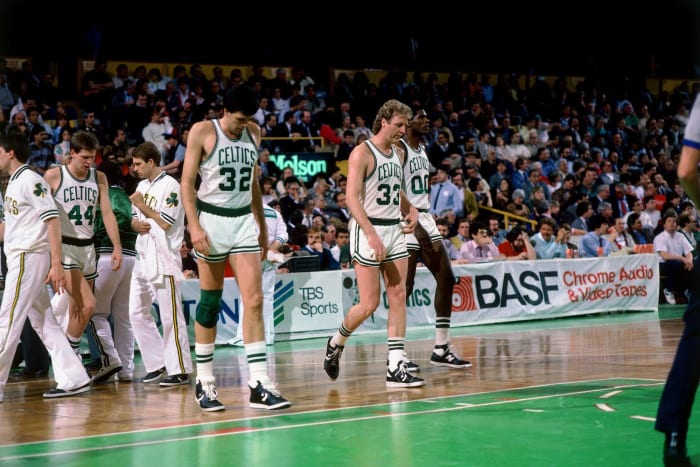
Dynasty: 1980-1987; three championships, five Finals appearances
In a bit of a cruel turn of events, the Larry Bird Celtics had the tough luck to have overlapped with the Showtime Lakers to create one of the best NBA Finals rivalries ever. When the Celtics lost to the Lakers in the 1987 NBA Finals, no one knew that would be the last time that team would reach the title round. The Eastern Conference got tougher as the Detroit Pistons finally overtook Boston, while Michael Jordan's Bulls were beginning to form their own dynasty. Bird began to have back issues that limited him, while Kevin McHale struggled with ankle issues and both would retire in 1992 and 1993, respectively. Head coach K.C. Jones retired in 1988, and the sudden deaths of Len Bias and Reggie Lewis would eventually leave the franchise starless for the first time in decades.
Showtime Lakers
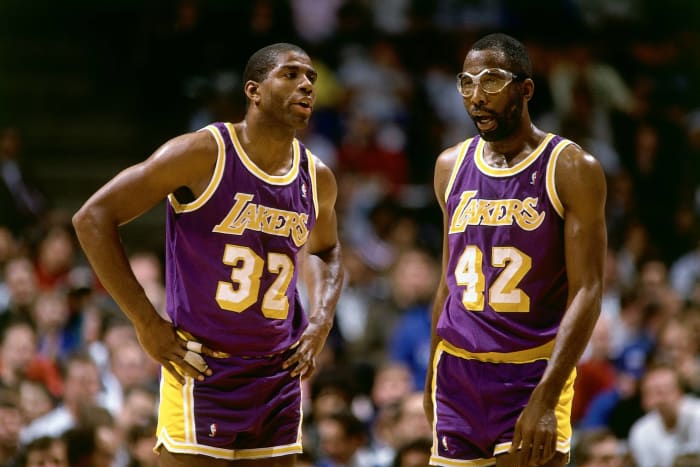
Dynasty: 1979-1991; five championships, nine Finals appearances
Los Angeles was swept in the 1989 Finals by the Pistons in Kareem Abdul-Jabbar's final season which was the first major piece of the dynasty to leave. Head coach Pat Riley left the Lakers after the following season citing burnout and Mike Dunleavy took over. Sam Perkins signed as a free agent and a young Vlade Divac revitalized the franchise and got them to the 1991 Finals where they lost to the Bulls. The enthusiasm ended as Magic Johnson immediately retired early in November 1991 after learning he contracted HIV. James Worthy got older, Perkins was dealt to Seattle and the team was forced to rebuild around draft picks.
Bad Boy Pistons
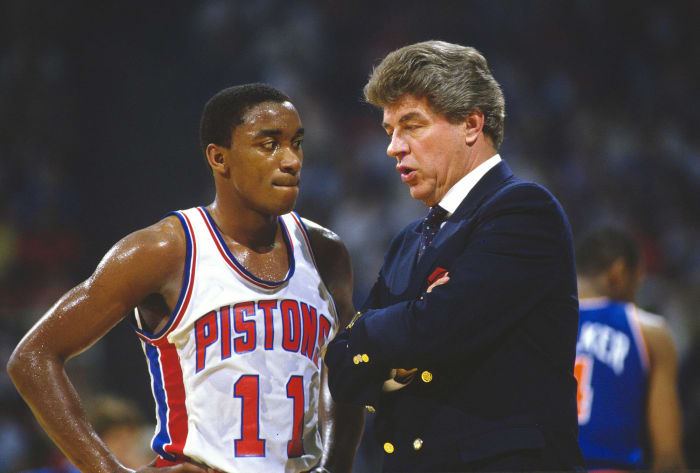
Dynasty: 1987-1990; two championships, three Finals appearances
The Pistons' run may have netted only two championships, but the team really changed the NBA. The Lakers-Celtics run of the 1980s ended because of the Pistons and their controversial style of physical play. Just as the Pistons ended the Celtics run in the Eastern Conference, Chicago ended Pistons' run by finally beating them in the conference finals in a sweep. (The lasting image is of the Pistons walking off the court before the game ended and refusing to congratulate the Bulls.) The roster began to fall apart as players were dealt away (Dennis Rodman, John Salley, James Edwards), and Bill Laimbeer (1993) and Isiah Thomas (1994) retired. Joe Dumars was the lone holdover, and he would become a mentor to Grant Hill in the mid-1990s. The sweep at the hands of the Bulls in 1991 would be the last playoff series win for the franchise until 2002.
Clutch City Rockets
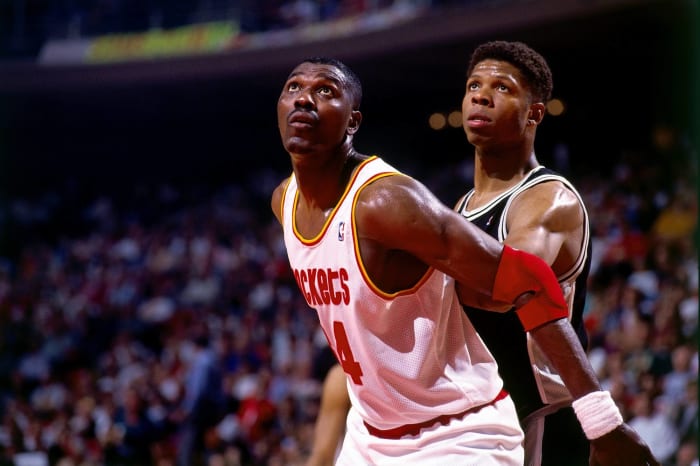
Dynasty: 1993-1995; two championships, two Finals appearances
The Rockets' championships in 1994 and 1995 tend to be knocked down because they occurred during Michael Jordan's retirement seasons, and the 1995 team began the playoffs as the No. 6 seed in the Western Conference. The franchise would rebrand with those "pajama" blue uniforms and the cartoonish rocket, and while it failed to make another Finals appearance it was still very much in the hunt. In 1997 the team reached the Western Conference Finals behind the trio of Hakeem Olajuwon, Clyde Drexler and Charles Barkley. Drexler retired in 1998, and the Rockets brought on Scottie Pippen to take his spot but it didn't yield postseason success. Houston would acquire the draft rights to Steve Francis, trade a moody Pippen and lose Barkley to injury and eventually retirement. Olajuwon would be traded to Toronto in 2001. A year later the team would use the top overall draft pick on Yao Ming to usher in a new era of Houston basketball.
Jordan's Chicago Bulls

Dynasty: 1990-1998; six championships, six Finals appearances
Michael Jordan's second retirement after the 1998 season (as well as Krause's desire to avoid a slow decline) helped facilitate an exodus and the sudden start to Chicago's rebuilding process. Phil Jackson walked away, Dennis Rodman was let go and Scottie Pippen was traded to the Rockets. Other key pieces like Steve Kerr and Luc Longley were dealt away, and the Bulls quickly sank to the bottom of the standings during a lockout-shortened season. It was an abrupt dismantling of one of the greatest teams in league history. The franchise attempted a quick rebuild behind Elton Brand, Eddy Curry and Ron Artest, but it took seven years before the Bulls made the postseason again.
Shaq and Kobe Lakers

Dynasty: 1999-2004; three championships, four Finals appearances
The 2000s Lakers had a championship level of success despite a volatile mix of egos that came to a boiling point during a 2003-2004 season. Aging Gary Payton and Karl Malone joined the fray, and the ongoing saga of Kobe Bryant's sexual assault case in Colorado put even more pressure on the team. After the Lakers were embarrassed by the Pistons in the Finals, Jackson left and the team had to make a decision to keep Shaq or Kobe (who was a free agent) in a me-or-him demand from each player. O'Neal was traded to Miami, Payton and Rick Fox were traded to Boston, Malone retired, Rudy Tomjanovich became the head coach and Bryant re-signed with the team as the focal point of the franchise. Bryant's reputation was damaged, and the Lakers would struggle over the next few years to find players to complement him.
Kobe and Pau's Lakers
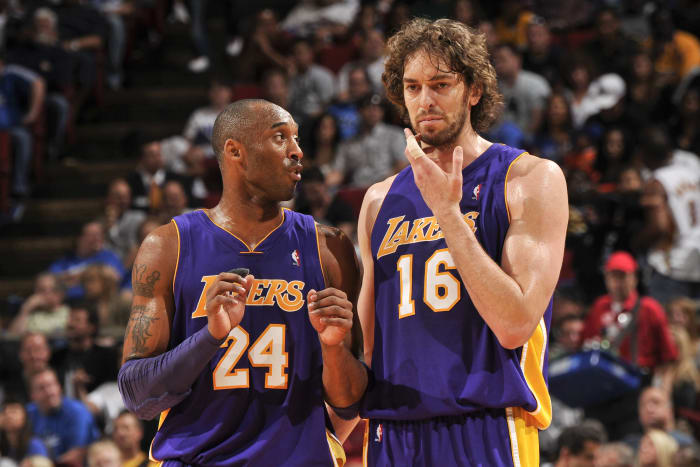
Dynasty: 2007-2010; two championships, three Finals appearances
Los Angeles pulled off a stunning deal to acquire Pau Gasol, and the Lakers would return to the Finals in 2008 where they would lose to the Celtics in six games. After titles in 2009 and 2010, the Lakers couldn't sustain that excellence due to some moves that didn't work out. Phil Jackson would retire after the 2010-2011 season, and a trade that would have brought Chris Paul to L.A. was vetoed by commissioner David Stern and left the players the Lakers were trading away upset. The roster was in upheaval and the acquisitions of a banged-up Steve Nash and an embattled Dwight Howard bombed mightily. Kobe Bryant would tear his Achilles late in the 2013 season and was never really the same player again.
The Heatles
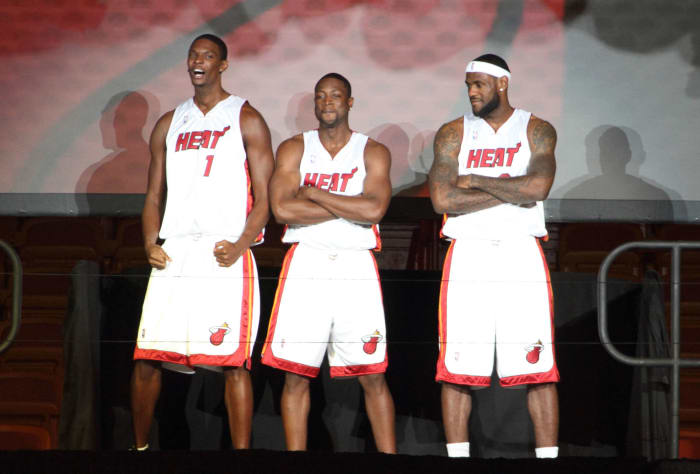
Dynasty: 2010-2014; two championships, four Finals appearances
The Miami Heat dynasty began with "The Decision" and ended with another "Decision." LeBron James decided to leave the Heat after the 2013-2014 season and return to Cleveland. Despite Dwyane Wade and Chris Bosh remaining in Miami, the team sunk to just 37 wins and missed the playoffs. The role players who did well surrounding James didn't fare as well without him, and Ray Allen didn't re-sign with the team. Wade slowed down noticeably, and doctors found serious medical issues with Bosh. The "Heatles" era in Miami sort of gave birth to the idea of players teaming up to form super teams for a finite amount of time and then moving on. The Heat have handled the post-Big Three era pretty well, considering the amount of talent that left the team.
San Antonio Spurs
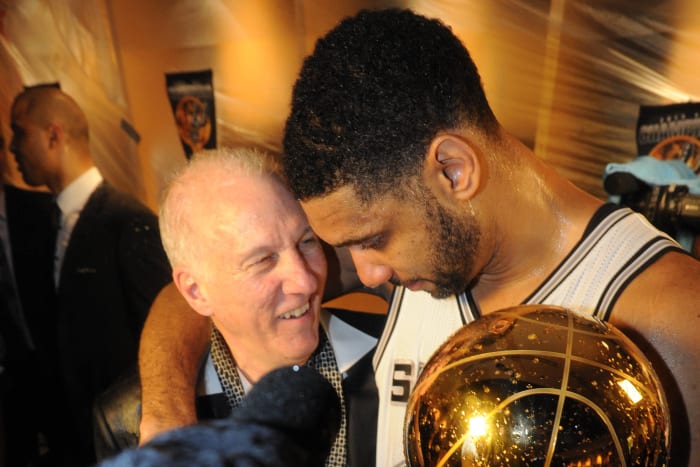
Dynasty: 1999-2014; five championships, six Finals appearances
The Spurs dynasty isn't like the others in the fact that it takes place over a massive amount of time with championships sprinkled throughout. The Spurs have gone through many roster changes during that time, but Gregg Popovich and Tim Duncan were there the entire time. Duncan retired after the 2015-2016 season and was followed by Manu Ginobili's retirement in 2018. Tony Parker left via free agency, and the Spurs traded Kawhi Leonard — presumably the heir apparent to the Spurs franchise — to Toronto before the 2018-2019 season. San Antonio's streak of 18 straight 50-win seasons ended in 2017-2018. While there has been no indication that Popovich is ready to move on, the Spurs' outstanding era of excellence seems to have ended.
LeBron's Cavaliers

Dynasty: 2014-2018; one championship, four Finals appearances
Like the Miami Heat, the Cavaliers run with LeBron lasted just four seasons that found them in the NBA Finals each year. Unlike the Heat, the Cavs won just one title but it was done in spectacular fashion, coming from 3-1 down in the Finals, winning Cleveland's first title and cementing James' legacy. After four consecutive seasons of facing the Golden State Warriors in the Finals, LeBron headed to the Los Angeles Lakers and left behind a roster that was built to complement him. It wasn't just James' departure that left the Cavs in a tough spot though, as Kyrie Irving demanded a trade in the 2017 offseason. Isaiah Thomas, who was acquired in the Irving trade, clashed with LeBron and was dealt away months later.
More must-reads:
- Watch: LeBron James is furious after Lakers bench doesn't challenge call
- Suns could be forced to trade Kevin Durant this offseason
- The 'Most points in a playoff game by team' quiz
Breaking News
Customize Your Newsletter
 +
+
Get the latest news and rumors, customized to your favorite sports and teams. Emailed daily. Always free!
Use of this website (including any and all parts and
components) constitutes your acceptance of these
Terms of Service and Privacy Policy.

